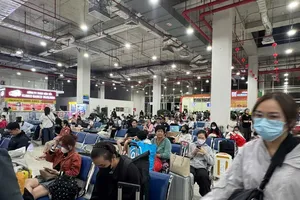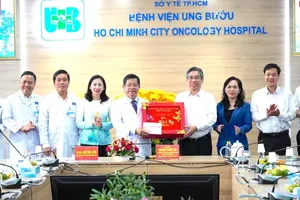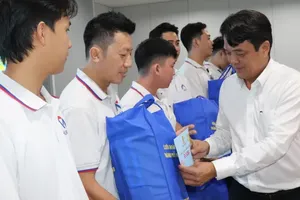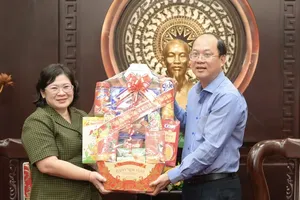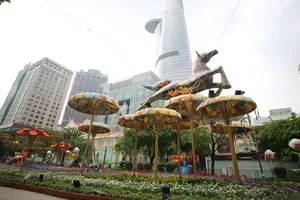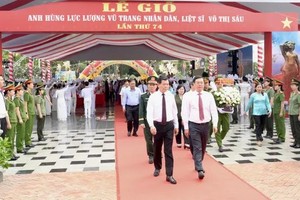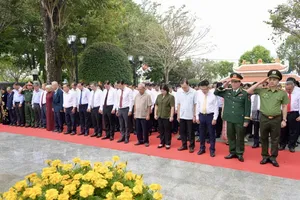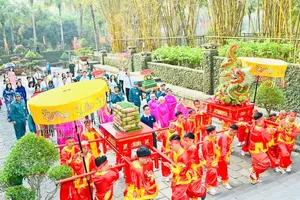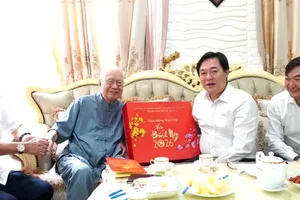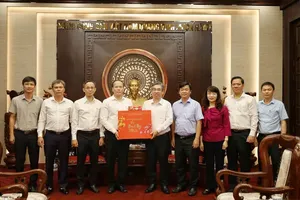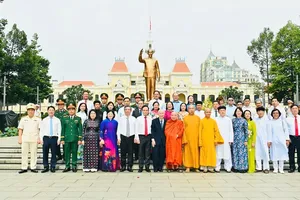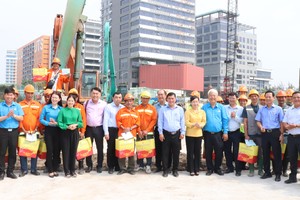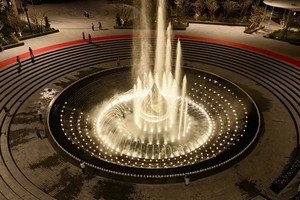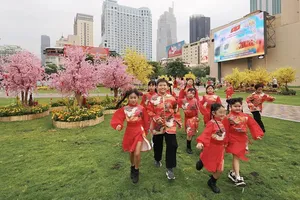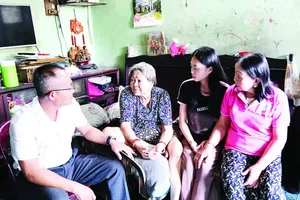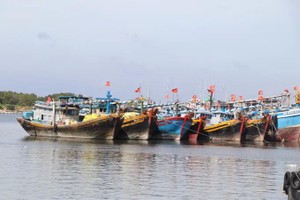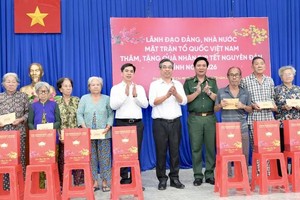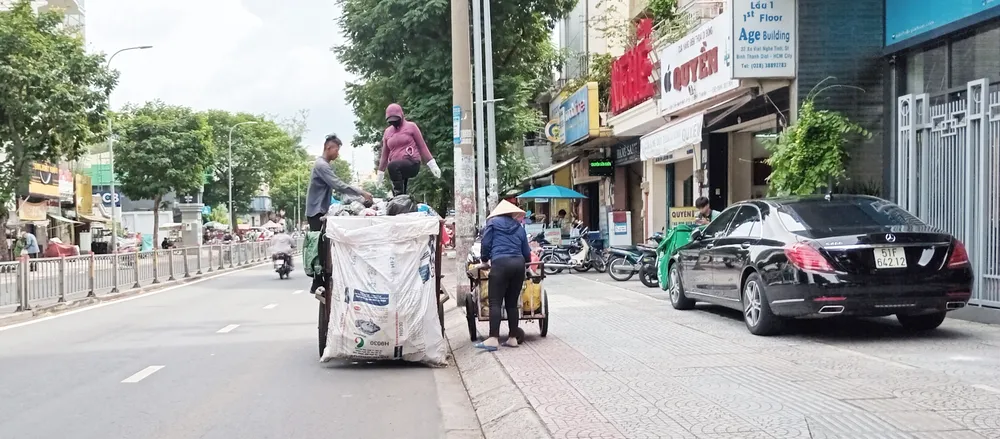
Currently, Ho Chi Minh City generates approximately 10,000 tons of household solid waste each day. To address the ever-increasing costs of waste management, the city initiated a pilot waste sorting program at the source. However, nearly 15 years have passed, and this program has gradually faded from public attention.
Lack of synchronization
The waste sorting program at the source was first launched in 2011 at Co.op Mart supermarkets, companies within the Saigon High-Tech Park, and the Tan Thuan Export Processing Zone. By 2013, the program was expanded to several residential clusters in District 1 and later continued in some neighborhoods in Districts 3, 5, 6, and Binh Thanh.
Practical implementation has revealed that the sorting rate is only 10-20 percent, highlighting several challenges. Notably, due to insufficient coordination, even when residents sort their waste, it often gets mixed back in with other waste before being sent to landfills. Currently, Co.op Mart supermarkets, industrial zones, export processing zones, government offices, and schools continue to implement the pilot waste sorting program at the source program. However, in some neighborhoods that previously participated, the situation has deteriorated into a model where participation is voluntary, with only those who wish to engage doing so.
According to residents in the area where the waste sorting program at the source was piloted in Alley 25 on Nguyen Binh Khiem Street, Da Kao Ward, District 1, the waste sorting movement was active and quite effective around 2013-2014. However, this effort is no longer sustained, and participation has become sporadic. “When we sort waste at home—separating household waste from plastic bottles—the collectors don’t keep them separate but just throw everything into the same truck. Moreover, while we are urged to sort our waste, some areas comply while others do not,” shared a resident from Alley 25 on Nguyen Binh Khiem Street.
Similarly, on Phan Van Han Street in Ward 17, Binh Thanh District, residents discard their household waste into a single foam box or plastic bag left at their door, mixing various types of waste together, despite this street being part of the pilot waste sorting program at the source program since 2017. Le Thi Hue, a resident on Phan Van Han Street, noted that the initiative was initially extremely vibrant, with everyone participating willingly. However, in recent times, waste sorting has been neglected as residents perceive it to be ineffective, given that sorted waste ultimately ends up being collected together in one bin.
No waste-to-energy incineration plant yet
Experts suggest that the limited success of the waste sorting program is largely due to the city's lack of modern waste treatment projects. According to the HCMC People's Committee, there are currently five companies contracted to provide household solid waste treatment services, namely Vietstar Investment Corporation, Tam Sinh Nghia Investment Corporation, Vietnam Waste Treatment Company, Tasco Corporation, and HCMC Urban Environment Company Limited.
However, only Tam Sinh Nghia Investment Corporation has begun construction on a waste-to-energy incineration plant. Phase 1 is expected to be completed by the end of 2025, with a total investment of VND6.4 trillion and a waste processing capacity of 2,000 to 2,600 tons per day. For Vietstar's waste treatment technology conversion project, the HCMC People's Committee has issued an investment decision, with construction anticipated to start by the end of this year. The project by Tasco Corporation is currently under review by the Department of Planning and Investment, which is coordinating with relevant departments to present an investment certificate amendment to the People's Committee of HCMC in accordance with regulations.
Vietnam Waste Treatment Company is currently preparing an investment project proposal to submit to the HCMC Department of Planning and Investment for review and adjustment of the investment decision. For the project by HCMC Urban Environment Company Limited, the Department of Planning and Investment has issued guidance to help the company complete the procedures for obtaining approval to convert from sanitary landfill technology to waste-to-energy incineration (Phase 1). This means that, as of now, there are no operational waste-to-energy incineration plants.
According to Ms. Nguyen Thi Thanh My, Deputy Director of the HCMC Department of Natural Resources and Environment, the city is facing a significant challenge regarding waste-to-energy projects. Although the Government has approved the National Power Development Plan 8, the allocated capacity for electricity generated from waste in the city by 2030 is only 123 MW. This capacity is insufficient to implement household solid waste incineration projects aimed at reducing the proportion of waste treated through landfilling, as outlined in national policy. Therefore, the city has proposed that the Ministry of Natural Resources and Environment and the Ministry of Industry and Trade recommend to the Prime Minister the prioritization of increasing HCMC’s waste-to-energy capacity to a minimum of 240 MW, in order to align with the current status of implementing waste treatment projects utilizing incineration technology.
Thus, the effective implementation of the waste sorting program can only occur when waste-to-energy incineration projects become operational and when the city’s waste-to-energy capacity is increased. This is an urgent task that will contribute to improving the living environment in the city.
Concerning the waste treatment technology conversion project by Vietstar Investment Corporation, on July 30, the HCMC Department of Natural Resources and Environment sent a letter to the Departments of Natural Resources and Environment in provinces and cities nationwide, seeking input on whether Vietstar has violated any land laws or, if violations have occurred, whether they have been rectified according to decisions or judgments that have taken effect from competent authorities. Recently, Mr. Nguyen Toan Thang, Director of the HCMC Department of Natural Resources and Environment, confirmed that the Department has determined there are no violations by Vietstar nationwide. The consultation with the various Departments of Natural Resources and Environment is being conducted in accordance with the provisions of the 2024 Land Law.
